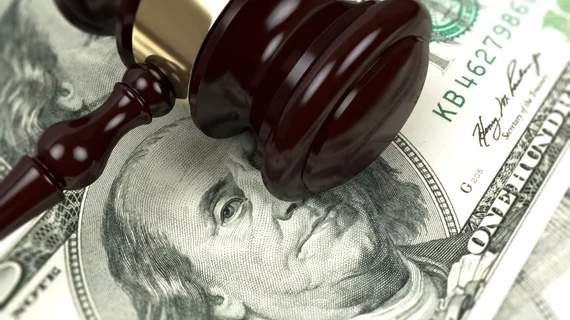Federal court sides with radiologists, vacating 600% fee increase under No Surprises Act
A federal court has sided with radiologists and other physicians in an ongoing fight over surprise-billing legislation.
United States District Judge Jeremy D. Kernodle issued the order Thursday, vacating the 600% fee increase for independent dispute resolutions under the No Surprises Act. The feds had previously escalated the cost from $50 to $350 in a bid to tamp down the volume of disputes between physicians and insurers over out-of-network payments.
Physician groups cried foul, with the Texas Medical Association challenging the change in its ongoing court battle over the NSA. Bob Still, executive director of the Radiology Business Management Association, called the ruling “a significant victory for providers, especially within the field of radiology.”
“Considering that most radiology claims are less than $350, this specific change would have disproportionately affected our industry, contradicting the underlying principles of the law,” Still told Radiology Business Friday morning. “We commend the federal court's ruling and look forward to engaging in the development of fairer regulations and guidance.”
Following the decision, the Centers for Medicare & Medicaid Services issued an alert Friday warning of an “unplanned outage.”
“As a result of the [Texas Medical Association] IV decision, effective immediately, the departments have temporarily suspended the Federal IDR process, including the ability to initiate new disputes, until the departments can provide additional instructions,” CMS said Aug. 4.
The American College of Radiology has banded together with the American College of Emergency Physicians and American Society of Anesthesiologists to jointly advocate for specialists’ NSA interests in court. Emergency physicians issued an update about the decision Friday, noting that it follows “months of advocacy” from ACEP and allied organizations fighting to address their “extensive concerns.”
The three societies previously filed an amicus brief specifically tied to the “unlawful” fee escalation and restriction of claims-batching to only the same or similar service codes. ACEP noted that the order also strikes down restrictions around batching. However, the court rejected a request to reimburse radiologists and other physicians who paid the increased fee for arbitration, along with a separate demand to extend the arbitration filing deadline. ACR issued its own update Friday, labeling the ruling as a "step forward."
“For the [independent dispute resolution] process to work as the No Surprises Act intended, it must be accessible, fair and efficient,” ACR Chief Executive Officer William T. Thorwarth, MD, said in a statement. "The ACR stands ready to work with the government, patient groups, our collaborators in these legal actions and other stakeholders to achieve those goals for the IDR. Neither this court ruling nor our actions impact NSA patient protections nor raise patient costs. Unfortunately, the government’s suspension of the entire IDR process may mean that those who continue to provide out-of-network care may have no mechanism to be appropriately reimbursed for these vital services."
Editor's Note: This story has been updated to include a comment from ACR's CEO.

